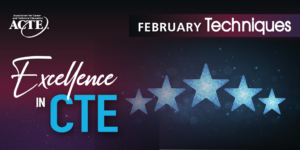NOCTI values great teaching. As such, each year, the organization honors dedicated career and technical education (CTE) teachers with the Carl J. Schaefer Memorial Award. The late Carl J. Schaefer, Ph.D., was a founding board member of NOCTI and a strong believer in high-quality CTE.
“I am certain he had no idea of the impact his legacy would have,” wrote John Foster, retired president and CEO of NOCTI, for Techniques in 2014. “Schaefer focused on helping his students succeed and engaged others in recognizing the importance of CTE.” Now, for Techniques in 2024, Foster has interviewed four past recipients of the Schaefer award. And our hope is that their stories will be an inspiration to others.
Great CTE teachers engage >amp; challenge students.
Brian Peffley is a pastry chef instructor at Lebanon County Career and Technical Center in Pennsylvania. With more than 25 years of experience in CTE, and 10+ years in the hospitality industry prior to teaching, he arrived for our interview with a “spice rack” of stories. He explained that he frequently shares these spices with his learners to emphasize key points in a lesson. It makes the lesson come alive for the learners.
His favorite technique in the classroom involves showing and then doing. Another leverages “pre-knowledge.” For example, prior to making bread in class, Peffley uses technology to deliver “pre-knowledge.” He assigns learners to watch a series of introductory videos that he has created and posted online. Then they practice each step with him. During this time, he also encourages students to use their cell phones to refer back to the recordings.
Pastry arts is a combination of repetition and style development. Peffley’s teaching strategy allows for both, and he said this helps learners to retain important information. He keeps students engaged, challenged and productive using this method. A fond memory involves one of his learners who recently won Gold at SkillsUSA. He recalled watching that student’s competence and confidence grow.
Great CTE teachers emphasize real-world skills.
Nichole Shearer is a cosmetology instructor at Greene County Career and Technology Center in Pennsylvania with more than 10 years of CTE experience and 15+ years in salon management. Also, prior to teaching, she worked with the state board of cosmetology to license cosmetologists. Shearer believes in the power of bringing her real-world experiences to the classroom to underscore her content.
When asked about her fondest memory in the CTE classroom, she explained that there are many, and it is hard to focus on just one. Each year brings something new. “You just know when you’ve changed a life for the better,” she said. She shared a story about a recent graduate who entered her three-year program a year late. This learner struggled with the content and didn’t have the funds to purchase a mandatory tool kit for class, but she never gave up. Ultimately, this learner received a scholarship to finish her instruction and pay for her tool kit, and she was recognized at graduation for her stellar achievement. “It’s experiences like this that make it great to come to work every day.”
Shearer’s advice to new CTE teachers was simply this: “It gets better.” Everyone says the first three years as a CTE teacher are the hardest. She continued, “Don’t get overwhelmed by the plans that don’t work the way that they were supposed to. Keep going! The rewards are worth it!”
Great CTE teachers make connections >amp; ask for help.
Allison Barry is an instructor of design and visual communications at Minuteman High School in Massachusetts, where she has worked since 2015. Prior to entering the field of teaching, she worked as a graphic designer for 13 years. Barry said she always enjoyed the technical side of graphic design and figuring out how to solve layout and printing problems, but she knew she wanted to use her skills for something else. Then after bumping into a former employer who had told her that she was a “natural teacher,” and who had just transitioned into the classroom themselves, she took the leap!
Barry believes in learning a skill, implementing it immediately and providing ongoing opportunities to use and build upon that skill. And while her field is both technical and creative, the creative parts can sometimes fall by the wayside. So, to emphasize creativity, she incorporates 15-minute drawing sessions into her classes. Or she asks students to read an article, then discuss with their peers. She feels it is important, especially with freshmen, to keep them engaged with a variety of activities.
She advises new CTE teachers to find safe (trusted) people that you can talk to in your early years. Ask questions like, “How do I keep students busy for six hours?” “We just had a fire drill. How do I get them back on topic?” “The lesson I just gave was not effective. How do I fix it?”
Great CTE teachers develop high-quality learning experiences.
Charles Mann teaches agriculture and welding technology at Carson High School in Nevada. He has 10 years of teaching experience, during which he has taught agricultural science, veterinary science, floriculture and more. He is also a national facilitator for the National Association of Agricultural Educators.
Mann grew up in a ranching community and wanted to ensure that others had the opportunity to find a trade they love. Now, during his career as a CTE educator, he has observed his learners move into careers using plasma cutting for their craft. And he has seen others go on to use their welding skills building trailers. Wherever his former students end up, he feels he has helped set them up for success. Mann said he often gets cards or compliments thanking him for pushing them to be their best selves. Those relationships are really special!
His fondest memory involves watching learners grow and challenge themselves as they become more proficient. He advises new CTE teachers to join an organization that best fits them as individuals and helps them to grow professionally. “Teaching is a great way to learn,” he said. “Build community with the people around you to share ideas, successes and failures.”







